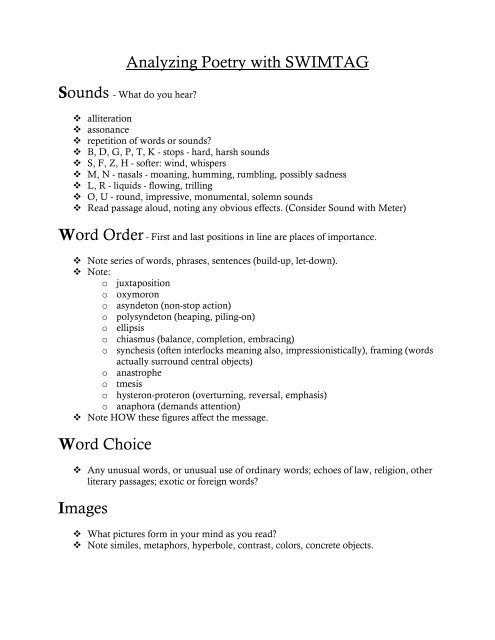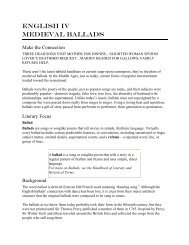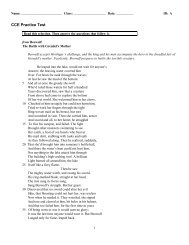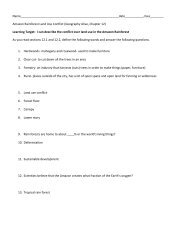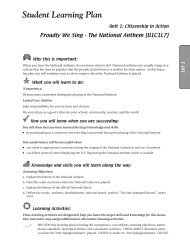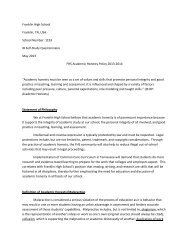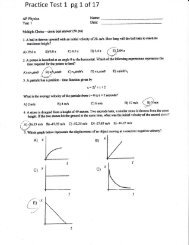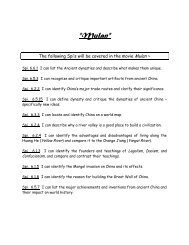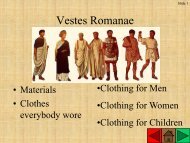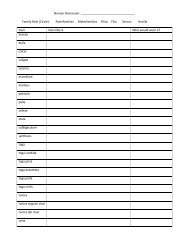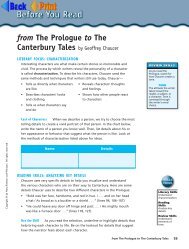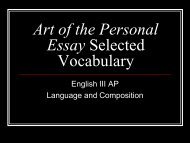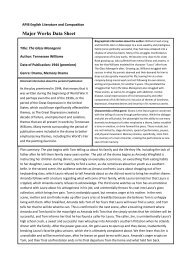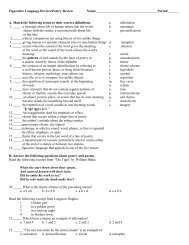Analyzing Poetry With SWIMTAG
Analyzing Poetry With SWIMTAG
Analyzing Poetry With SWIMTAG
Create successful ePaper yourself
Turn your PDF publications into a flip-book with our unique Google optimized e-Paper software.
<strong>Analyzing</strong> <strong>Poetry</strong> with <strong>SWIMTAG</strong><br />
Sounds - What do you hear?<br />
alliteration<br />
assonance<br />
repetition of words or sounds?<br />
B, D, G, P, T, K - stops - hard, harsh sounds<br />
S, F, Z, H - softer: wind, whispers<br />
M, N - nasals - moaning, humming, rumbling, possibly sadness<br />
L, R - liquids - flowing, trilling<br />
O, U - round, impressive, monumental, solemn sounds<br />
Read passage aloud, noting any obvious effects. (Consider Sound with Meter)<br />
Word Order - First and last positions in line are places of importance.<br />
Note series of words, phrases, sentences (build-up, let-down).<br />
Note:<br />
o juxtaposition<br />
o oxymoron<br />
o asyndeton (non-stop action)<br />
o polysyndeton (heaping, piling-on)<br />
o ellipsis<br />
o chiasmus (balance, completion, embracing)<br />
o synchesis (often interlocks meaning also, impressionistically), framing (words<br />
actually surround central objects)<br />
o anastrophe<br />
o tmesis<br />
o hysteron-proteron (overturning, reversal, emphasis)<br />
o anaphora (demands attention)<br />
Note HOW these figures affect the message.<br />
Word Choice<br />
Any unusual words, or unusual use of ordinary words; echoes of law, religion, other<br />
literary passages; exotic or foreign words?<br />
Images<br />
What pictures form in your mind as you read?<br />
Note similes, metaphors, hyperbole, contrast, colors, concrete objects.
Meter - Scan by reading aloud<br />
Note preponderance of dactyls or spondees in any lines.<br />
dactyls - faster, lighter, lilting; spondees - slower, heavier, grander.<br />
Several elisions together - halting, emotional, fearful. Rhythm often reflects pace or<br />
mood of narrative.<br />
Mood<br />
What feelings come through?<br />
Look at adjectives and verbs. Is it formal, tragic, frightening, joyous, foreboding?<br />
Tone<br />
Can you sense or infer the author's attitude about the characters or the action (from<br />
choice of words or actual comments to reader)?<br />
Theme<br />
How does the passage relate to the overall theme(s) of the work?<br />
Note philosophical beliefs and/or political program.<br />
Allusions<br />
Note proper nouns - myths, customs, beliefs, history, geography.<br />
Note significance and how and what these add to the passage.<br />
Grammar<br />
Look at pattern of verb tenses - any unexpected?<br />
Look at person of verb. Who speaks? - To whom?<br />
Tone formal or intimate? (2nd sing. - more intimate)<br />
Many passive verbs?<br />
Imperatives imply authority;<br />
Gerundives, obligation.<br />
Interjections imply strong emotion<br />
Is sentence structure convoluted, complex? Are sentences short, abrupt? Does<br />
sentence structure reflect action?


